But some scholarship donors are advancing this goal through their focus on students from particular schools—like the Catholic schools in Fordham’s backyard.
One of the newest such efforts is the Cristo Rey‒Fordham Scholarship Fund, which supports Fordham students who graduated from schools in the Cristo Rey network. The fund’s initial gift came from Thomas Kelly, M.D., FCRH ’71, who sought to help students overcome financial need and receive a Jesuit education, which for him took place at Canisius High School in Buffalo, New York, and then at Fordham, with scholarship help.
“Those were important years for me, and therefore I’d like to see the next generation have that opportunity,” said Kelly, a member of the Fordham University President’s Council.
Schools in the Cristo Rey network serve students from lower-income backgrounds, providing a four-year corporate work-study program that helps pay their tuition. Nearly all Cristo Rey graduates at Fordham come from Cristo Rey New York High School in East Harlem. Kelly’s scholarship adds to Fordham’s own commitment, announced four years ago, to meet up to the full cost of tuition for students from the Cristo Rey network.
Bronx Catholic Schools ‘Feed’ Fordham
Further north, in the Bronx, are Catholic high schools with socioeconomically diverse students that have long been “feeder” schools for Fordham—educating many a first-generation Irish American like William Rockford, FCRH ’67, GSAS ’72. A “dayhop” student who commuted to Fordham and worked his way through, he established a scholarship to Fordham for students at his alma mater, All Hallows High School, seeking to help the less-advantaged students of today.
He and his wife have been contributing to the William D. and Beverly B. Rockford Endowed Scholarship for more than two decades. “I hope it helps out these kids that are probably very ambitious but couldn’t afford to get a good education,” he said.
Albert Salvatico, FCRH ’71, another Bronx native from a working-class background, established a scholarship with his wife, Jean, to enable graduates of his own alma mater, Cardinal Hayes High School, to come to the University. A believer in diversity, equity, and inclusion efforts, he wanted to help students overcome socioeconomic barriers to a Fordham education.
So far, the scholarship has helped eight Hayes graduates do just that. “It’s been one of the more rewarding things of my life,” he said.
Learn more about Cura Personalis | For Every Fordham Student and make a gift.
]]>He always looks forward to it. “They’re very engaged, and it’s fun to answer questions about my experience … as a business student and somebody who’s immersing into the corporate world,” he said.
Cintron is one of several Gabelli students involved in a program that seeks, among other things, to increase diversity at the Gabelli School by attracting more students from underrepresented groups. Dubbed the Corporate Communications High School Pipeline Program, it’s a way of engaging with Fordham’s New York City community and giving students an opportunity to serve and learn from others, in keeping with the University’s Jesuit mission.
It operates mostly at Catholic high schools. Cintron, a student co-director of the pipeline program, took part in it himself while attending one of those high schools, Cardinal Hayes High School in the Bronx. That makes his teaching especially rewarding, he said. “The program, honestly, gave me the confidence that I would succeed in business, so it’s nice to be able to spread that confidence to other students.”
Because of its potential for enhancing diversity at Fordham by attracting more students from the Bronx, one of the most diverse areas in the United States, “I’m really proud to be part of the program,” Cintron said.
Helping more students from underrepresented communities come to Fordham is one goal of the University’s current $350 million fundraising campaign, Cura Personalis | For Every Fordham Student. To advance this effort, donors have been contributing to the recently established Gabelli Diversity, Equity & Inclusion Scholarship Fund for academically strong students who, like Cintron, came through the pipeline program.
Creating a High School to University Pipeline
Founded five years ago, the pipeline program prepares students for business school through mentoring, corporate site visits, a class on the Fordham campus, and a pitch proposal competition. Working in teams, students at each school devise a strategy for addressing an issue of diversity, equity, and inclusion that arose in a Fortune 500 company. The winning strategy is chosen by a panel of judges drawn from industry.
The class taught by Cintron and other students helps the high schoolers prepare for this competition. Cintron’s fellow student co-director, Luz Perez-Arias, said it’s “amazing” to teach the class because of the students’ eagerness and the research, public speaking, and presentation skills they’re learning. She came through the pipeline program herself as a student at Aquinas High School, which has since closed.
“When these kids learn these skills, they’re going to appreciate it so much when they go to college, because this is something that I’m doing now” as a Gabelli School sophomore, she said. “I know that they’re going to make use out of it, and that makes me happy.”
Cintron and Perez-Arias are recipients of the Gabelli diversity scholarship. It has several contributors, including two lead donors who, as it happens, know what it’s like to be part of an underrepresented group themselves.
Benefactors with Bronx Roots
Eileen Walsh, GABELLI ’76, and Mary Ann Bartels, GABELLI ’85, GSAS ’92, both became supporters of the scholarship via Fordham’s giving circles, a form of participatory philanthropy that grew out of the University’s annual Women’s Summit, for which Bartels has been a keynote speaker.
They were both drawn to support the scholarship because of their own stories. Walsh, a Bronx native and daughter of Irish immigrants, graduated from the Bronx’s Academy of Mt. St. Ursula, now one of the pipeline schools. After graduating from the Gabelli School, she secured a “Big 8” accounting firm job at a time when such a thing was unusual for women.
“I do give credit to Fordham and the Gabelli School for helping me succeed,” she said, “in a very serious position that not many women had at the time.”
She serves as a judge for the pitch competition at the Academy of Mt. St. Ursula and calls it “magical” to see how the students grow through the program.
“They are way ahead of the game,” said Walsh, a retired audit partner at KPMG and member of the Gabelli School advisory board’s executive committee. “They have an idea of what business is, they have an idea of what successful companies are, they have an idea of how poorly and how well the companies may have done because of what they did or didn’t do—and they can give a presentation that will knock your socks off. They effectively know how to work as a team, which in business is huge.”
Bartels also grew up in the Bronx, on City Island. A self-described “risk student,” she was accepted with the help of a strong recommendation from a neighbor who worked at Fordham. “Fordham took a chance on me,” said Bartels, chief investment strategist at Sanctuary Wealth, who believes she would not have had a successful Wall Street career without the help of the University’s faculty and administrators.
She has been giving back to the University for years—as a donor and a member of advisory boards and the President’s Council. The Gabelli scholarship fund caught her interest because she’s well aware of the community it serves. “It’s part of the area that I grew up in, so it really touched my heart,” she said. “To be able to give back to other people in the community that have gifts and talents and can go to, really, an elite institution to further their ability and skillset and interest really appealed to me.”
Cultivating Diversity in Business
There’s “a huge pedagogical imperative” to having greater diversity among Gabelli School students, said Clarence E. Ball III, the school’s director of diversity, equity, and inclusion, who founded and still directs the pipeline program. “Learning outcomes for all students—at the Gabelli School and at the high schools—are increased when they have access to a diverse range of human perspectives,” he said.
Ultimately, businesses need greater diversity in their ranks as they seek to be more socially responsible, he said. “If you want to be an agent for change in society, you need all perspectives of the society in order to be an agent of that change.”
To inquire about giving to any area of the University, please contact Michael Boyd, senior associate vice president for development and university relations, at 212-636-6525 or [email protected]. Learn more about Cura Personalis | For Every Fordham Student, a campaign to reinvest in every aspect of the Fordham student experience.
]]>
The program, which focused on students from the Bronx, particularly those from underserved communities, was made possible through a $300,000 Knowledge in Freedom Grant from the Teagle Foundation.
Stephen Grimm, Ph.D., who served as the director of the program, said he gave the students three pieces of advice throughout the program: Be curious, be humble, and be ambitious.
“And I’m pleased to say that it happened wonderfully,” he said during the graduation ceremony that included the students’ families. “My biggest hope is that in 15 to 20 years, one of these students will be standing here, will be directing this seminar.”
First-Time Philosophers
For many of the high school students in the program, this was the first time they had ever studied philosophy.
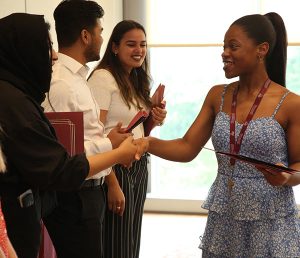
“I didn’t really know much about it, and now that I do, it’s something I am considering majoring or minoring in,” said Newone Samuels, a rising senior at St. Catherine’s Academy. “It gave me a new way of thinking. I’m very open minded on certain different situations now.”
She added with a laugh that her favorite philosopher is Socrates because she loves “how he sees life and how he deals with situations in his own way.”
Oscar Massey, a rising senior at Cardinal Hayes, said that he saw pretty quickly how he could utilize the critical thinking and debate skills he has learned from philosophy.
“Studying philosophy made me realize that although I didn’t know philosophy itself, I actually practice philosophy in everyday life,” he said. “If I’m talking about sports or video games, everybody has a little debate sometimes, so it was really cool to be able to understand and to learn from some of the greatest philosophers.”
Jaydee Cantos, a rising senior at Bronx Latin, said that she felt like the program pushed her to expand her mind and to do things she wasn’t always comfortable with, such as speaking out during class.
“I was kind of already open-minded, but with the philosophy class, it made me more open minded to look at everybody’s perspective and not be biased,” she said. “And even with this program in general, it puts you out of your comfort zone to meet a whole bunch of different people. In high school, you need that to make connections.”
Program Day to Day
The three-week program included a mix of academic, social, and college-prep components. Students lived on the Rose Hill campus at Loyola Hall during the week. During the day, they took philosophy classes with Grimm and other professors, including Vita Emery, Ph.D., a postdoctoral fellow.
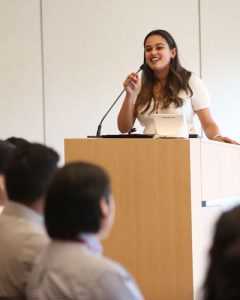
“For me, one of the coolest things was we would have discussions in the classroom, and then if I went to lunch with them, or later in the afternoon, they would still be talking about some of the debates we had,” Emery said. “They would be using [philosophy]to prove points to each other and that was really cool to see that they were having fun in the classroom, which is the point. They’re having fun learning.”
In the afternoons, they worked with four Fordham students who served as resident teaching assistants (RTAs). The RTAs helped them not only with their class assignments, but also with proofing resumes, filling out job and college applications, and understanding college life.
“We conducted small groups where people shared their feelings, discussed affirmations about themselves and their personal goals, and talked to us about college,” said Suzan Juncaj, a rising Fordham College at Rose Hill junior, majoring in international studies and minoring in French. “They have a lot of questions as high schoolers, and for some of them, we’re their only mentors who have college experience.”
Laura Rodriguez, a rising junior in Fordham College at Rose Hill who is majoring in psychology and minoring in philosophy, emphasized that Grimm chose residential teaching assistants not only based on their studies and their mentoring experience, but also on whether they had similar backgrounds to the students in the program. This helped create meaningful relationships, she said.
“One thing I think Dr. Grimm did really was getting RTAs that were originally from the Bronx or from the New York area,” she said. “I think that really helped us connect with them more fluently, and especially with most of us being minorities and them being minorities—if they see people who look like them they’re more inclined to relate to us.”
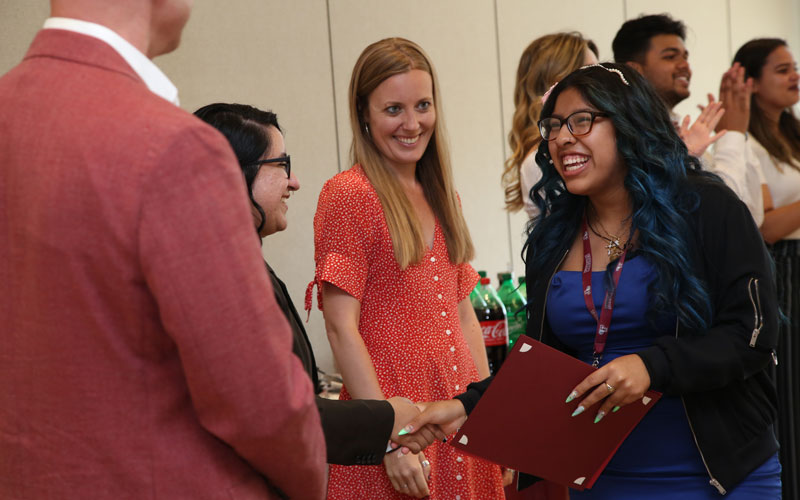
There were also field trips to local institutions, such as the New York Public Library, and guest speakers that included other professors from different disciplines as well as representatives from the Office of Undergraduate Admission.
“The most impactful thing from [the guest speaker sessions]was definitely the mentoring—we got to meet a lot of professors on campus,” said Joshua Persaud, a rising senior at Cardinal Spellman, adding that it pushed the students to think about what they’d like to major in.
In the evenings, the students had the chance to socialize, both with each other and students from other schools, including students from a Columbia summer program who they beat in a kickball game on Eddies Parade.
Lessons Carried Forward
The high school students said that the program helped them not only gain philosophical and academic experiences, but friendships and a sense of what college could be like.
“You get to make new friends, and experience things differently, and have fun on campus,” Samuels said. “I’m still the same person, but staying here has given me a sense of freedom and I feel like I’m definitely going to be ready for college.”
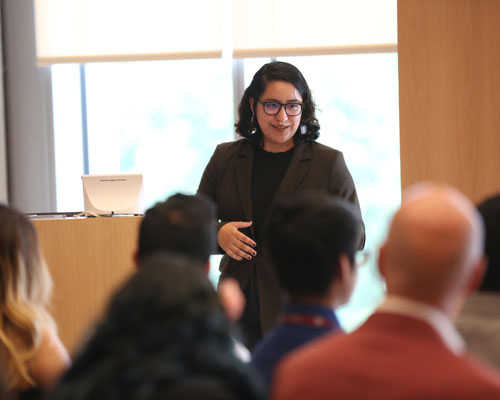
Layla Mayorga, a second-year Ph.D. student in philosophy at Fordham, who served as a graduate student mentor for the program, said that she hoped they learned from this experience.
“They’re first-generation [students], so I think it’s a good experience to know what college life is, and what it is to read college materials, and that it’s not that different from high school, and that philosophy is always everywhere.” she said.
But the high schoolers weren’t the only ones who had takeaways from the program. Nazeath Emama, a 2022 Fordham College at Rose Hill graduate who majored in math and anthropology and will be continuing her studies at the Graduate School of Arts and Sciences, served as a resident teaching assistant for the program and said that she loved getting to connect with the students.
“The kids call us older siblings, like big sister, big brother type vibes,” said Emama, who did a similar program at Columbia while she was in high school. “I really appreciate that they said that we were like their siblings, because those are people that you look up to, those are people you ask actual questions to without being fearful of getting judged.”
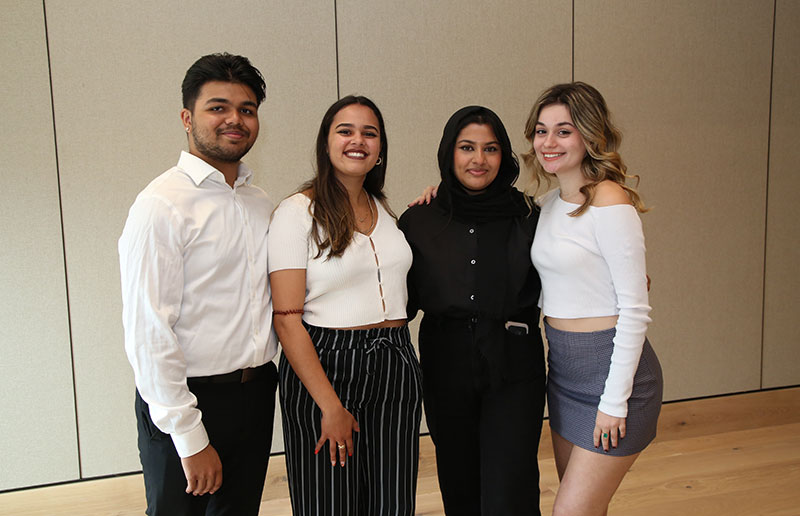
“I want to give back to places that helped shape who I am,” says Dawson, who majored in economics at Fordham, was an All-Patriot League linebacker for the Rams, and earned a spot on the league’s academic honor roll. “I’ve been giving my time and input to drive things toward what’ll be beneficial for more people. I think that’s something that’s really valuable.”
Returning to His High School, in Several Roles
After graduating from Fordham College at Rose Hill, Dawson returned to Hayes (as the school is known) to serve as the football team’s linebackers coach. He later took on an expanded role as defensive coordinator.
In January 2020, he joined the school’s administrative team as assistant director of alumni engagement, and by November he was promoted to director. In this role, Dawson organizes events for alumni, solicits donations for student scholarships and financial aid, and communicates with young alumni to keep them engaged and up to date on what’s happening at the school.
Dawson’s days are long, he says, but he relishes the opportunity to help students get in the door and thrive at Hayes, noting that his recruitment work for the football program provides a clear example of the benefits derived from alumni donations.
“We have to find a way to fund people and come up with financial assistance for kids who can’t afford to pay full tuition,” Dawson says. “So that ties right back into my job in the alumni office of soliciting donations to go toward tuition assistance.”
Showing Up and Being a Presence
Dawson’s affinity for both Fordham and Hayes is made even stronger by the links between the two Bronx schools.
In 2015, Fordham developed a partnership with Hayes—home to many African American and Hispanic students who would potentially be the first in their families to attend college. That partnership began with a mentoring program that pairs Fordham undergraduates with Hayes students, and it has grown to include ongoing collaborations with WFUV, Fordham’s public media station; the Gabelli School of Business; and the Graduate School of Education, among other areas of the University.
Recently, Dawson worked on a project in which leaders at Hayes tapped Gabelli marketing students to compete to create a new slogan and banner for the school’s capital campaign, with the winning designs to be unveiled in the coming weeks.
At Fordham, Dawson and several other former Fordham football players have started what he calls “a mentorship group for Black and brown student-athletes.” While they have only worked with football players so far, they hope to expand their mentorship roles across other sports, as well.
One of the things that drew Dawson to join the FUAA Advisory Board, he says, was the opportunity to let fellow graduates know that, while alumni giving can make a big difference in students’ lives, there are other ways to give back to Fordham.
“I know a lot of times, alumni feel like being part of the school is only an option if you can donate,” Dawson says. “And I’m trying to tell them, ‘Listen, you can show up to events and be a presence. And that’s giving back to the school in a big way.’”
Fordham Five
What are you most passionate about?
I think I’m most passionate about helping people. Being able to give back, whether it’s advice or shared experiences, I think that’s what I’m most passionate about.
What’s the best piece of advice that you’ve ever received?
I got a quote from one of my teachers in high school. They said, “You’ve got to do what you have to do, so that you can do what you want to do.” And that kind of sat with me. It resonated with me, just because that’s how life is. You’ve got to put in the work in order to have fun. And if you try to have fun before you put the work in, that’s when things don’t usually work out for you.
What’s your favorite place in New York City? What’s your favorite place in the world?
Favorite place in New York City has to be my hometown, Soundview, in the Bronx. I love that place more than anything. And then in the world? I haven’t really traveled much. But I took a trip to Toronto two years ago and that was amazing. I loved it. It was awesome. We went in the winter, so it was pretty cold out there. But if I could do it again, I’d definitely go back to Toronto at least three or four more times.
Name a book that has had a lasting influence on you.
Across That Bridge: A Vision for Change and the Future of America by John Lewis. I read it the year right after I graduated. It was very powerful. It’s pretty much an autobiography, with him just talking about his experiences and the civil rights movement through his eyes. [There are] a lot of gems that last with you for a while, in terms of inspirational stuff and motivational stuff, and stuff to make you want to effect change. It was really powerful.
Who’s the Fordham grad or professor that you admire the most?
I would say Judge Robert Holdman [FCRH ’86, LAW ’91] . He’s part of the Gridiron Club [support group for Fordham football], and he’s always been there for me. He’s been a mentor and a resource for me since I started at Fordham. And then I’ll throw in a bonus one: my boy, my [former Fordham]teammate Chase Edmonds. I was with him the day of the [2018 NFL] draft, and we’ve been really close since he got to Fordham. I’m a year older than he is. So seeing him get to the NFL and then continue to do the things that he did in college is pretty cool.
Many students at Hayes—as the school is known—are potentially the first in their families to attend college. Most are Hispanic and African-American, and many come from single-parent homes in the South Bronx whose families struggle financially, said the school’s principal, William Lessa.
Four years ago, Fordham developed a partnership with Hayes that began with a mentoring program and has expanded to include work with WFUV, the Gabelli School of Business, the Graduate School of Education, and Fordham-based Jesuits. The collaboration has evolved into a symbiotic relationship between two schools that share similar missions and values, said staff from both institutions.
“Our partnership with Cardinal Hayes is a critical one,” said Joseph M. McShane, S.J., president of Fordham. “Students cannot aspire to a life they do not know exists, and they cannot achieve that life unless they are taught that it belongs within their grasp. If that were the only reason for the partnership, it would be enough. But engagement with the Hayes students, their families, and their community also enriches Fordham. We are wiser, better grounded in the lives of our neighbors, and the beneficiary of great talents that would otherwise go untapped, were it not for this partnership.”
The ties between the two schools have given Fordham students a window into what life in the South Bronx looks like, said Roxanne De La Torre, FCRH ’09, GRE ’11, director of campus and community leadership for Fordham’s Center for Community Engaged Learning.
“For our students to get more exposure to the Bronx—the South Bronx, in particular—for our students to get out of our campus and meet people who live and work and go to school here in the Bronx, is a huge positive,” said De La Torre, who helped drive the partnership between the two schools.
And for many young men at Hayes, exposure to Fordham’s staff and students has broadened their horizons and opened doors.
“Our kids are fascinated by them … They have no idea who lives out there,” said Lessa, adding that the partnership is also important to his students’ families. “I think our parents have decided to invest a considerable amount of money into their sons’ education in the hopes that they’ll be the first person in their homes to go onto college. Education is transformational and can be a change agent in their lives.”
‘The Best Tutor’
Several days a week, Fordham students visit Hayes and tutor students in an after-school academic support program called Period 9.
“Although [the Hayes students are] tired from a full day of classes, they attend Period 9 so they can get that extra help they need in a particular subject,” said Emily Padilla-Bradley, the school’s dean of studies. “Throughout the years, I’ve realized that the students have learned to appreciate, more and more, the help from the tutors from Fordham.”
One of those tutors is Manuel DeMatos, a Fordham College at Rose Hill senior who will be studying adolescent education at the Graduate School of Education next year.
“Just knowing that you’re having a positive impact and that these kids are improving their potential life—not just in high school, but into the future—is super rewarding,” said DeMatos, who wants to become a high school social studies and French teacher.
The Cardinal Hayes students in Period 9 are an eclectic bunch. There’s Calvin Lanier, a junior who plays football. There’s Leonel Nepomuceno, a senior who sings in the school choir and loves animals—including his three pets, Hailey the miniature poodle, Joshua the orange tabby cat, and Rango the turtle—so much that he’s considering studying veterinary science in college. Then there’s Albert Alexander Almanzar, a self-described class clown who often played around instead of focusing on his studies. But his years at Hayes—and a Fordham student named Thomas Bradley—changed him, he said.
Almanzar called Bradley, a student at the Gabelli School of Business, “the best tutor.”
“[He] gives me more motivation to want to do better in my classes because it shows me somebody that cares,” Almanzar said of Bradley, who tutored him in U.S. history and writing. “All day in school, people show that they care. But somebody that’s a little younger, I feel like I could relate to more… that means more to me.”
Finding A Passion for Public Radio
For the past three years, members of WFUV, Fordham’s public radio station, have paid an annual visit to Cardinal Hayes and, in a conversation with the entire junior class, shared what the students can learn at the station.
“There is this station that is right within their borough, within the University, that offers the kind of opportunities that they’re not going to find at other colleges and universities across the United States,” said Chuck Singleton, general manager at WFUV, which is ranked among the top 20 college radio stations by the Princeton Review.
Those visits have led to three paid internships for Hayes students, including Ramon Liriano, a senior who worked in the sports department last summer. Like many of his high school peers, he’s potentially the first in his family to complete a college degree. Thanks to his internship at WFUV, he said, he’s also discovered a potential career in sports broadcasting.
“I’ve seen my family struggle, especially my mother, who works two jobs [as a housekeeper]. I’ve seen her come home looking tired, especially late at night—sometimes, 1 or 2 o’clock in the morning,” said Liriano. “She’s put me in a Catholic school, pushed me to become better than what she has done in her life … I want to take this opportunity to study something really good in the world that can help provide for my family.”
Giving Students A Voice
Last year, a dozen Hayes honors upperclassmen took a corporate communications course through the Gabelli School of Business. From fall to spring, they learned how to deliver the perfect personal elevator pitch and put together an engaging presentation. They analyzed a Fortune 500 company that experienced a diversity-related crisis, like Starbucks, and presented a new diversity plan to their classmates. But perhaps most importantly, they learned how to become better communicators.
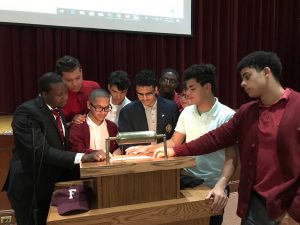
“The difference in how the students presented their work in class, how confident they were in their verbal responses, how confident they became in their social circles, all based on the communication competencies they learned in class … that, to me, was the most rewarding thing,” said Clarence Ball, lecturer and interim director of diversity, equity, and inclusion at the Gabelli School of Business, who teaches the course at Cardinal Hayes.
Five students from the initial cohort of Ball’s course are now first-year students at Fordham, including the 2019 Hayes valedictorian, Andy Lin.
Lin described himself as a shy student, who, as a high school freshman, used to read his speeches word-for-word from a piece of paper. Instead of making direct eye contact during presentations, he would look down. But by the end of Ball’s program, he saw a huge change in himself.
“Before I went up on stage to give my [valedictorian] speech, I did the exercises that Professor Ball always had us do,” said Lin, now a first-year Fordham College at Lincoln Center student who plans on studying computer science. “I messed up a few words here and there, but I was able to recompose myself and keep moving on.”
These relationships that Fordham professors and students are fostering in the community are something the University hopes to build on, said Michael C. McCarthy, S.J., vice president for mission integration and planning, who helped found the Center for Community Engaged Learning. Using its Hayes relationship as a model, Fordham is now working on a similar partnership with Aquinas High School, an all-girls Catholic high school in the Belmont section of the Bronx.
“My hope is that our partnership with Cardinal Hayes is one of many such partnerships with institutions in the Bronx, where students can engage their community more effectively,” said Father McCarthy. “We want to help faculty leaders to connect with community leaders to build up student leaders.”
[doptg id=”164″]Trading Teachers Across the Bronx
Several Hayes teachers have studied at the Graduate School of Education, thanks to the support of a Fordham scholarship that almost halves tuition costs for full-time professionals in faith-based non-public schools, said principal William Lessa.
And in the past three years, three Fordham-based Jesuit scholastics have volunteered at Cardinal Hayes. These young Jesuits who have just finished novitiate are deepening their faith through local community service, said Joseph O’Keefe, S.J., GSAS ’80, a current scholar in residence at the Graduate School of Education and Fordham trustee who was just chosen to lead the new USA East Jesuit province.
“The idea is to work in the Bronx community and to reflect on that as part of their preparation to become priests,” Father O’Keefe said.
At Hayes, the scholastics have counseled students dealing with tough situations at home, taught religion classes, and helped seniors navigate the college admission process.
“They’re there to help. But they also learn from people’s experiences,” said Father O’Keefe.
An Alumnus from Both Schools
At the heart of the partnership between the two schools is Donald Almeida, Fordham trustee and retired vice chairman of PwC.
Almeida, who grew up in Yonkers, New York, is a ’69 Hayes and ’73 Fordham alumnus who now serves on the boards at both schools. Over the past several years, he has spearheaded the partnership between his two alma maters and, with his wife, supported many students—including young men who have experienced homelessness.
Among his mentees is a Hayes student whom Almeida chose not to identify by name. The student plays basketball so well that he will likely receive many Division I offers, said Almeida, who has attended his sports games and cheered him on from the sidelines. He’s also occasionally taken the student and his mother out to dinner.
“I’m his ‘bro,’” said Almeida. “That’s what he calls me.”
A while back, Almeida learned that the student was considering leaving Hayes and attending a prep school, in hopes of being recruited by better college sports teams. But Almeida said he was more focused on getting the student into the best academic college program.
Almeida recalled the day he sat in his Rhode Island home, gazing at the ocean, when his cell phone rang. It was the student’s father. For two hours, they debated whether or not the student should stay at Hayes.
“Thirty seconds after I hung up the phone with his father, [the student] calls me to tell me he’s staying at Hayes,” said Almeida, noting that the student is not the only one benefitting from their relationship. “The more you impact their lives, the more satisfaction you get.”
]]>